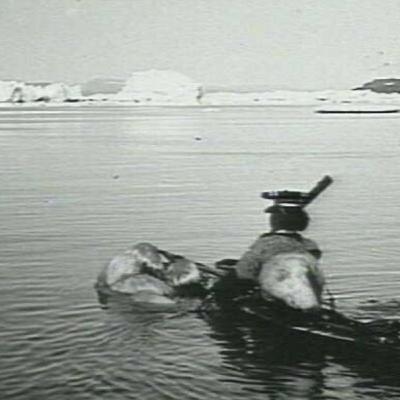Discover The John Batchelor Show
The John Batchelor Show

The John Batchelor Show
Author: John Batchelor
Subscribed: 4,363Played: 2,555,184Subscribe
Share
Description
The John Batchelor Show is a hard news-analysis radio program on current events, world history, global politics and natural sciences. Based in New York City for two decades, the show has travelled widely to report, from the Middle East to the South Caucasus to the Arabian Peninsula and East Asia.
5000 Episodes
Reverse
Guest: Professor Edward J. Watts. Heraclius defeated the Persian Empire only to lose the Middle East to rising Arab forces, devastating Rome's food and financial supplies. Facing famine and new barbarian threats like the Avars, Romans interpreted these disasters as divine punishment, leading to the religious policy of Iconoclasm to appease God.
Guest: Professor Edward J. Watts. The Nika riots, sparked by chariot racing factions, nearly toppled Emperor Justinian until Empress Theodora convinced him to stay. After crushing the rebellion, Justinian built the Hagia Sophiato symbolize repentance and divine connection. He also launched costly military campaigns to retake Italy and North Africa.
Guest: Professor Edward J. Watts. Following Julian's failed attempt to restore paganism, Theodosius embraced Christianity and suppressed traditional Roman religion. Simultaneously, the mishandling of Gothic refugees fleeing the Huns led to rebellion. After the Roman leadership refused to negotiate extortion payments, Alaric the Goth sacked the city of Rome in anger.
Guest: Professor Edward J. Watts. Emperor Diocletian reorganized the empire's administration and persecuted Christians to protect his new system. Following Diocletian's retirement, Constantine seized power through civil war, attributing his military victory to a Christian vision. Constantine subsequently established Constantinople as a new, grand capital to rival Rome.
Guest: Professor Evan Ellis. Latin America is seeing a shift away from leftist "Pink Tide" governments toward pro-U.S. administrations in countries like Argentina and Paraguay due to failures in addressing security and corruption. Despite this political shift, China continues to ensure repayment of its loans, even from struggling regimes like Venezuela.
Guest: Professor Evan Ellis. Events in Caracas are shaping upcoming elections in Brazil and Colombia, pushing leaders like Lula toward moderation to appease centrist voters. In Colombia, frustration with President Petro's policies and security failures may favor right-wing candidates. Meanwhile, Peru's election focuses on public insecurity and deep Chinese investment.
Guest: Professor Evan Ellis. Havana is in panic as the loss of Venezuelan oil threatens to break the country's petroleum-fired power infrastructure. With the currency in freefall and massive blackouts, the regime hopes to muddle through despite enormous suffering, while Washington's rhetoric signals that external pressure will continue.1959 HAVANA
Guest: Professor Evan Ellis. Venezuela's oil industry has collapsed due to the firing of professionals and lack of maintenance, leaving infrastructure dangerous and unable to process heavy crude. With storage at capacity, the U.S. is using "coercive diplomacy" to manage oil flows while legal disputes hamper future investment.1904 CARACAS
Guest: Brandon Weichert. Chinese tech giant Baidu is developing high-end chips to boost its market valuation. However, the Chinese state drives this "chip war" for military control and resilience rather than profitability. Despite some puffery regarding capabilities, China is serious about creating indigenous alternatives to American technology.1954
Guest: Alan Tonelson. China's leadership is likely stunned by setbacks with allies in Venezuela and Iran. While Chinarelies on coal, the loss of cheap oil imports will squeeze its industry. Furthermore, China's strategy of exporting its way out of trouble faces backlash from foreign markets protecting their own manufacturers.1945 OCTOBER 10
Guest: Rebecca Grant. The Arctic has become a battleground where Russia and China are increasing military cooperation, including bomber flights and naval exercises. The U.S. needs to expand its fleet of icebreakers and sensors to counter threats, such as Chinese ballistic missile submarines potentially operating under the ice.1904 Greenland
Guest: Steve Yates. China expects repayment for its loans to Venezuela, but the U.S. "Monroe Doctrine 2.0" aims to cut adversaries out of the hemisphere. By blocking oil shipments, the U.S. leverages economic power to disrupt China'ssupply chains, potentially forcing Beijing to rethink its global energy strategy.1932 Shanghai
Guest: General Blaine Holt. The operation in Caracas revealed that Chinese-made air defense systems failed to detect U.S. aircraft. Electronic warfare capabilities and stealth technology likely blinded radars, rendering Russian missile systems useless. This success signals a crackdown on illicit networks, alerting regional leaders to U.S. resolve.
Guest: General Blaine Holt. The U.S. seized a Russian-flagged vessel, the "Bella 1," in the Atlantic, prompting a Russian submarine to track the operation. This Cold War-style confrontation highlights the risks of miscalculation as Washington enforces an energy quarantine against Venezuela, targeting shadow fleet vessels involved in illicit activities.
Guest: Behnam Ben Taleblu. Reports of the Ayatollah planning to flee are likely inaccurate; the regime's ideology drives it to fight rather than seek exile. Despite economic strain, Tehran continues funding proxies like Hezbollah to maintain its transnational terrorist apparatus. The regime also seeks to exploit chaos in Syria to reassert influence.
Guest: Behnam Ben Taleblu. The Iranian regime faces a critical mass of dissatisfaction, responding with violence against protesters and hospitals rather than addressing grievances. Inflation for food has reached nearly 73 percent, and medical security is nonexistent. Unlike in 2009, opposition is rallying around figures like Crown Prince Reza Pahlavi.
PREVIEW FOR LATER TODAY: Evan Ellis discusses the impact of events in Caracas on Brazil's upcoming election. Lula da Silva faces scrutiny over ties to Chavista elites, while the Bolsonaro family alleges political persecution by the courts. The "cultural war" continues as Brazil grapples with leftist policies and deepening Chinese engagement.1914 RIO DE JANEIRO
PREVIEW FOR LATER TODAY: Rebecca Grant evaluates Canada's role as a NATO ally in the Arctic, balancing domestic responsibilities with North American defense. While the US lacks sufficient icebreakers to enforce claims, relations remain strong despite minor friction, though care is needed to avoid inadvertently pushing Canada closer to China.1925 GREENLAND
PREVIEW FOR LATER TODAY: General Blaine Holt analyzes Vladimir Putin's dilemma following Caribbeanmaneuvers and the seizure of a Russian shadow fleet vessel. Facing internal pressure from Kremlin war hawks, Putinseeks a way out of the morass, raising fears of escalation similar to the Cuban Missile Crisis or dangerous leadership changes.1962 CUBA
PREVIEW FOR LATER TODAY: Behnam Ben Taleblu reports on the dire state of Iran, where security forces target hospitals, forcing protesters to forego medical treatment. Beyond the brutal crackdown, political dissatisfaction is fueled by insane inflation rates, with foodstuff prices rising between 60 to 73 percent, driving sustained unrest.1900 PERSIA
















The antisemitic police commercial is a huge insult to commonsense. Enforcing the law drops crime. It worked during the 90's. Why not now.
vvpljl6ooo 9jy656uyyyyyy7
The John Batchelor Show offers insightful analysis on global events and history. Highly recommended for anyone interested in in-depth news coverage! Check it out: スプランキー https://play-sprunki.org
The title has nothing to do with the actual podcast. This is sadly an annoying habit that has somehow been taken up. This happens quite often.
hqr1
has nothing g to do with Ukraine. this is a retelling of the Cuban missle crisis.
what impact they will have on international space endeavors. If relevant resources or documentation are intended to accompany the commit, you might want to include a reference like https://mywguportal.com/ to direct users to a related portal or resource. Would you like help editing the commit message or improving documentation next?
The subject matter dosen't match the title. This seems to happen with many episodes.
have you seen the movie "The Castle". it's a great movie about exactly this legal issues.
I love how you incorporate https://misidegameonline.com examples and real-life situations to make your points. This article is a great blend of information and approachability, and I’m sure many will benefit from the knowledge you’re sharing.
there’s a cultural aspect at play; traditional https://mapquestrouteplanner.org values often emphasize saving over spending, particularly in uncertain times.
It would be interesting to see how these plans evolve https://polytrack.org/ and what impact they will have on international space endeavors.
Chang's insights suggest that Xi's leadership https://papaspizzeria2.org/ prioritizes a strict adherence to party doctrine and control over public discourse, contrasting sharply with Gorbachev's attempts at political openness and reform.
In a bold leap of innovation, Test Group engineers embarked on a daring venture: crafting a Frankenstein commercial airplane. Incorporating cutting-edge technologies and components sourced globally, this aviation marvel promises unparalleled efficiency and safety. From the fuselage to the avionics, each element synergizes seamlessly to redefine flight standards. Visit https://www.testgroup.com/ to witness the evolution of air travel, where pioneering meets reliability. Embodying resilience and ingenuity, this Frankenstein creation signifies a new era in aerospace engineering, bridging dreams with reality. Experience the future of flight with Test Group's visionary aircraft, where every journey begins with boundless imagination and precision engineering.
Thecepisodevhad nothing to do with WW2 but Italy's covid response from 2022. Someone is not checking.
ehelp
Who pays this woman?
⦁ This article contains very valuable information for beginners. This is a very informative blog for me, thank you for sharing this blog. . PDS International is also Best Digital Freight Forwarder PDS INTERNATIONAL PVT. LTD
like the news is not control in usa
john you keep pushing the war . Nazy state of Ukraine you're in the wrong side of history.